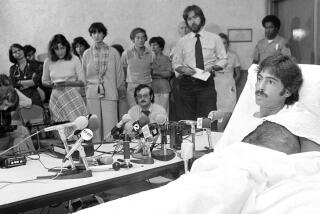Ex-Agent Backs Up Report of Nazi’s Arrest
- Share via
A former Counter Intelligence Corps agent who reported nearly 38 years ago that Dr. Josef Mengele may have been arrested by U.S. authorities in Austria said Friday that his information about the infamous Nazi war criminal came from a reliable source.
Benjamin J. M. Gorby, now an attorney in Tel Aviv, Israel, told The Times by telephone that he does not know whether the April 26, 1947, “Mengele Memo” prompted any action by the Vienna-based 430th CIC detachment to which it was sent.
Gorby’s memo was recovered from the files of the Department of the Army about two months ago under the Freedom of Information Act, but the Simon Wiesenthal Center for Holocaust Studies, which sought it, was unable to locate Gorby until late Thursday night.
Acting on tip from Washington, Rabbi Marvin Hier, dean of the center, spoke to Gorby by telephone. In a lengthy conversation, Gorby discussed his Army days in 1947, when he was operations officer for the 970th detachment of the CIC’s Region Five, located in Regensburg, Bavaria, Germany.
Prepared Statement
Rabbi Hier read a prepared statement of those recollections to reporters Friday at the Center’s Holocaust Museum on Pico Boulevard in Los Angeles. In the statement, Gorby said:
“To begin with, let me state that there is no doubt that I considered my source of information that Mengele was arrested by the U.S. as fully trustworthy--for I would not have sent out such a memo to another detachment located in a foreign country (Austria), nor would I have sought and obtained permission to do so by my commanding officer, but rather I would have simply filed the memo internally.
“The task of our CIC detachment was to gather information and pass on the data we deemed worthy and important to wherever it was considered appropriate and essential. Unfortunately, since many agents regularly reported to me in my capacity as operations officer, I do not remember, after 38 years, the name of my source, but I’m fully certain of its worthiness.
“It was outside my authority to take direct action . . . because my source did not identify Mengele as being in Zone Five . . . I was also not in a position to check on any follow-up to my memo or to obtain any possible additional information as to any action taken later.”
Gorby suggested that in 1947 the horrendous crimes of Mengele, a former captain in the SS, might not have been fully known.
“Still, many Polish survivors who made their way to my region had told me of the horrors of Auschwitz concentration camp. Therefore, when I received information from a reliable agent, I sent my memo about the man, described as the chief medical officer in Auschwitz, to Vienna.”
After leaving the Army in 1949, Gorby went to live in Israel. By the time the Wiesenthal Center located him there, Israeli officials already had spoken to the former agent about the Mengele memo.
Method of Questioning
Rabbi Hier said Friday that he does not know whether the Israelis questioned Gorby independently, or whether American officials asked them to interview him, possibly because of the prompting by the Wiesenthal Center.
“We believe that the legal and moral responsibility of the United States now is to conduct a formal investigation,” the rabbi said. “We are looking for documentation. We would be more than happy if a thorough investigation concluded there was no involvement (of the United States), we would be very grateful and pleased with such a result.”
Prompted to speculate on what it would mean if Mengele had been arrested by the 430th CIC detachment, then released, Rabbi Hier said: “It would be very suspicious.”
After the war, he said, one of the 430th’s jobs was to find and employ Nazis who might be useful for intelligence purposes.
Rabbi Hier said the center will take its fact-finding efforts to Washington next week. Center officials are scheduled to meet with the general counsel for the Central Intelligence Agency, hope to meet with the U.S. attorney general and plan to file suit in federal court asking that four documents withheld by the Department of the Army under the FOIA request be released.
According to Rabbi Hier, a reliable source who saw one of the documents said that it discloses that a man named Joseph Menke, possibly an alias for Mengele, entered Canada after applying for a visa in Argentina in 1962. If still alive, Mengele would be 73.
When Menke applied, a Canadian visa control officer in Cologne, Germany, wrote for background information from the U.S. Army Central Registry on June 18, 1962, and was informed that Menke was one of Mengele’s several aliases.
“What we do not know is whether the American intelligence that Joseph Menke was Josef Mengele is correct,” Rabbi Hier said.
The question is being investigated in Canada under orders of Prime Minister Brian Mulroney.
More to Read
Sign up for Essential California
The most important California stories and recommendations in your inbox every morning.
You may occasionally receive promotional content from the Los Angeles Times.












